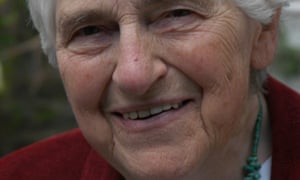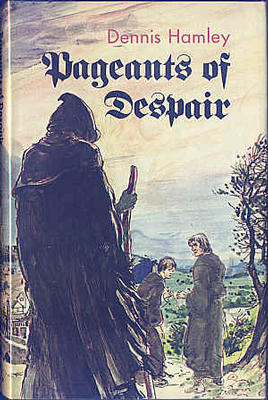Another death in the great writing family, by Dennis Hamley
I seem fated every year to be the bringer of sad news about a person who has been my friend, the friend of others on AE and a figure of respect and admiration to many other readers and writers. Jim Riordan, Bob Leeson, Patricia Miles.



 f
f
And now comes, for me, the saddest of all. Pam Royds, Children's Book editor, first at Andre Deutsch and then at Scholastic, was 91. She was the editor who started the writing careers of both Jan and me. Our debt to her is immeasurable. Is it significant that my twenty-six years as a Deutsch and Scholastic author ended just before she finally retired? As Jan will confirm, she was a noted fighter for her own writers. One of the last of the great children's book editors.

My first, initially bruising, meeting with Pam was in April 1973. Our first exchanges made me wonder why I'd even bothered to turn up. Yes, the lunch in Andre Deutsch's exclusive little dining room (those were the days!) was lovely and the whisky she insisted I drank before we started ('because you're going to need it', she said) was excellent although faintly dangerous, but I was not prepared for the instruction that she would only publish my book if I removed the first three chapters completely. For the first time I suffered the nightmare of all writers: desperate defensiveness over something deeply cherished and resignation that it was doomed whatever defence I constructed for it. Well, I gradually came round to the idea and the lunch suddenly became much more appetising, until Pam said, 'And when can I expect your next book?' I quickly edited out the rejoinder, 'But I've written you a book. Isn't that enough?' 'Oh, I do hate these one-book writers,' she said as if she was reading my mind, which she probably was. So I came home with very mixed feelings and my mind racing, obsessed with the idea that I had stepped onto some sort of everlasting treadmill. But by the time I got off the train I knew how to deal with my precious book's decapitation and also had the basic plot of my second book firmly in my head. The meeting had been a big success after all and had defined the future course of a large segment of my life. That brief two-hour period in the rickety old house in Great Russell Street taught me what good editing was and how accumulated wisdom alone could get to the heart of a defective manuscript.
This is why I feel very sad when I read of the de-professionalising of so many publishers and the consequent downgrading of the editor, the end of the nurturing of talent and the rush for survival at any cost. It's why I deplore today's common practice of the agent doing the big editing, to present the publisher with an 'oven-ready' (how I hate that expression) book. I've had at least one new writer who I mentor nearly broken by pages of radical alterations (of the sort wonderfully satirised on this blogspot by Catherine and Valerie, among others) required by the agents before they would commit to her novel - and then, when all seemed complete, the particular agent dealing with it left and the others didn't want to go on with it. The author's main relationship should be with the publishers, who are supposed to have the traditional responsibility for the development and nurturing of their authors. If the good editor requires changes, it is because she understands and empathises with the manuscript in front of her, wants it to succeed on its own terms and not merely to conform to an infantilised estimate of present-day taste. At least, that's how it used to be. It would appear that such a relationship is now virtually obsolete. But without it, I think I'd have given up after two years. Instead, I gained twenty-six years of wisdom and insight. Within Scholastic, I had other editors for particular books. But Pam's influence had spread to them all. And with David Fickling in charge of the whole Scholastic UK set-up (until he displeased the US bosses), there could be few better environments in which authors might flourish. I was very fortunate to be part of it. When, four years after my Scholastic career had fizzled out, I had books accepted by Walker, who should be my new editor but Pam's daughter, Caroline (Caz). The old tradition had been handed down and I found all the same qualities again. Except that this connection was cut short after three years by the accountants. Eheu. eheu!


My first two books with Pam, 1974 and 1976. How dated these paperbacks with carefully crafted cover images by Gavin Rowe look now!
 f
f
And here's my only picture book, after Pam introduced me to the wonderful Meg Rutherford.
A true story and a labour of love.
All obituaries I have read point to three books out of so many which define her contribution to children's and young adult books. Judy Corbalis's The Wrestling Princess and other stories (1986) was, as well as being very, very funny, among the strongest statements in fiction dramatising the then still not entirely accepted notion that girls should not meekly accept feminine stereotypes. Who wants to be a princess anyway? Our own Jan Needle's My Mate Shofiq was one of the very first young adult novels which looked fearlessly at racial tension. It had a real effect in schools. It was as big a step forward in pushing the boundaries of young adult fiction as was the publication in 1961 of John Rowe Townsend Gumble's Yard, the first book to treat working class kids as proper people instead of creatures to be patronised. Not published by Deutsch and some time before Pam took over - but she would have taken it like a shot if she could have.
An equally important event occurred in 1974, Pam published a collection of poems called Mind Your Own Business which a young poet, Michael Rosen by name, had spent years trying to get publishers to see the point of. Another decisive and unique voice only heard because of Pam's foresight. Pam gave me a copy of that first small, tentative print run. I must check to see if it's worth anything now. Not that I'm going to sell it, but as the first fruit of a career which has reached true influence and significance, it must be worth a fair bit.
I hope there will be a memorial service and that I hear about it in time, because I need to pay my final respects to this editor who has affected my life so profoundly. And if there is, I expect the church to be crowded by many other ageing but grateful authors!

An equally important event occurred in 1974, Pam published a collection of poems called Mind Your Own Business which a young poet, Michael Rosen by name, had spent years trying to get publishers to see the point of. Another decisive and unique voice only heard because of Pam's foresight. Pam gave me a copy of that first small, tentative print run. I must check to see if it's worth anything now. Not that I'm going to sell it, but as the first fruit of a career which has reached true influence and significance, it must be worth a fair bit.
I hope there will be a memorial service and that I hear about it in time, because I need to pay my final respects to this editor who has affected my life so profoundly. And if there is, I expect the church to be crowded by many other ageing but grateful authors!

Not the original Deutsch hardback cover (1988), but it is the original cover image, by the incomparable Meg Rutherford, who died in 2005. I still regard this as the best book I have ever written or am ever likely to write. It was Pam who brought us together and our collaboration lasted through four books, a poetry collection and a short story anthology.
Comments
And that was that!